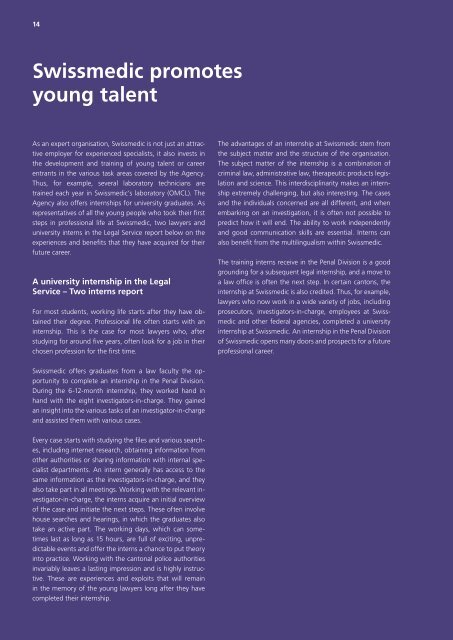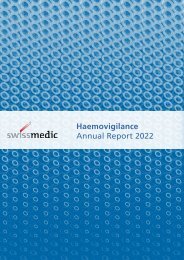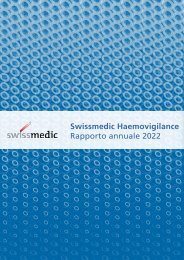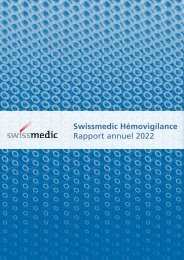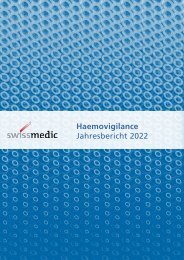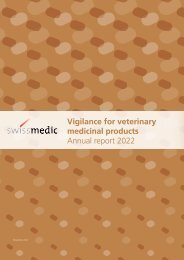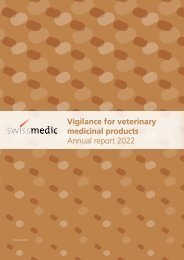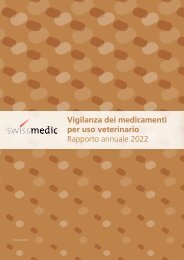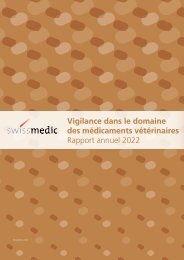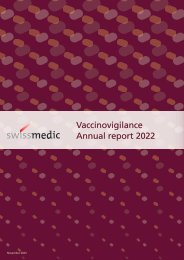Swissmedic Annual Report 2017: achieving success through collaboration
According to Stéphane Rossini, incoming Chairman of the Agency Council, the culture of collaboration will remain a factor in ensuring that Switzerland is successful in retaining a high-quality medicines control system: “A globalised economy and the international consumption of therapeutic products entail synergies and collaboration.”
According to Stéphane Rossini, incoming Chairman of the Agency Council, the culture of collaboration will remain a factor in ensuring that Switzerland is successful in retaining a high-quality medicines control system: “A globalised economy and the international consumption of therapeutic products entail synergies and collaboration.”
You also want an ePaper? Increase the reach of your titles
YUMPU automatically turns print PDFs into web optimized ePapers that Google loves.
14<br />
<strong>Swissmedic</strong> promotes<br />
young talent<br />
As an expert organisation, <strong>Swissmedic</strong> is not just an attractive<br />
employer for experienced specialists, it also invests in<br />
the development and training of young talent or career<br />
entrants in the various task areas covered by the Agency.<br />
Thus, for example, several laboratory technicians are<br />
trai ned each year in <strong>Swissmedic</strong>’s laboratory (OMCL). The<br />
Agency also offers internships for university graduates. As<br />
representatives of all the young people who took their first<br />
steps in professional life at <strong>Swissmedic</strong>, two lawyers and<br />
university interns in the Legal Service report below on the<br />
experiences and benefits that they have acquired for their<br />
future career.<br />
A university internship in the Legal<br />
Service – Two interns report<br />
For most students, working life starts after they have obtained<br />
their degree. Professional life often starts with an<br />
internship. This is the case for most lawyers who, after<br />
studying for around five years, often look for a job in their<br />
chosen profession for the first time.<br />
The advantages of an internship at <strong>Swissmedic</strong> stem from<br />
the subject matter and the structure of the organisation.<br />
The subject matter of the internship is a combination of<br />
criminal law, administrative law, therapeutic products legislation<br />
and science. This interdisciplinarity makes an internship<br />
extremely challenging, but also interesting. The cases<br />
and the individuals concerned are all different, and when<br />
embarking on an investigation, it is often not possible to<br />
predict how it will end. The ability to work independently<br />
and good communication skills are essential. Interns can<br />
also benefit from the multilingualism within <strong>Swissmedic</strong>.<br />
The training interns receive in the Penal Division is a good<br />
grounding for a subsequent legal internship, and a move to<br />
a law office is often the next step. In certain cantons, the<br />
internship at <strong>Swissmedic</strong> is also credited. Thus, for example,<br />
lawyers who now work in a wide variety of jobs, including<br />
prosecutors, investigators-in-charge, employees at <strong>Swissmedic</strong><br />
and other federal agencies, completed a university<br />
internship at <strong>Swissmedic</strong>. An internship in the Penal Division<br />
of <strong>Swissmedic</strong> opens many doors and prospects for a future<br />
professional career.<br />
<strong>Swissmedic</strong> offers graduates from a law faculty the opportunity<br />
to complete an internship in the Penal Division.<br />
During the 6-12-month internship, they worked hand in<br />
hand with the eight investigators-in-charge. They gained<br />
an insight into the various tasks of an investigator-in-charge<br />
and assisted them with various cases.<br />
Every case starts with studying the files and various searches,<br />
including internet research, obtaining information from<br />
other authorities or sharing information with internal specialist<br />
departments. An intern generally has access to the<br />
same information as the investigators-in-charge, and they<br />
also take part in all meetings. Working with the relevant investigator-in-charge,<br />
the interns acquire an initial overview<br />
of the case and initiate the next steps. These often involve<br />
house searches and hearings, in which the graduates also<br />
take an active part. The working days, which can sometimes<br />
last as long as 15 hours, are full of exciting, unpredictable<br />
events and offer the interns a chance to put theory<br />
into practice. Working with the cantonal police authorities<br />
invariably leaves a lasting impression and is highly instructive.<br />
These are experiences and exploits that will remain<br />
in the memory of the young lawyers long after they have<br />
completed their internship.


